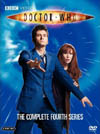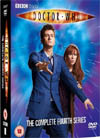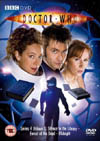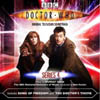Midnight
 |
 |
 |
DVD NTSC
Region 1
14-episode
box set




|
DVD PAL
Region 2
14-episode
box set


|
DVD PAL
Region 2
3-episode volume


|
|
(Doctor Who Story No. 201, starring David Tennant)
- written by Russell T. Davies
- directed by Alice Troughton
- produced by Phil Collinson
- music by Murray Gold
- 1 episode @ 44 minutes
|
Story: The Doctor's excursion to see the sapphire falls
on the planet Midnight goes awry when the transport car takes
a new route and runs across a force no humanoid has ever
encountered before. What form of life can possibly survive outside
in the extonic rays of the crystal planet's sun? And why has
one passenger started repeating everything that everyone
else says?
|
|
DVD Extras (box sets only) include:
- Audio commentary by
director Alice Troughton,
actor David Tennant (The Doctor),
and writer Russell T. Davies.
- Doctor Who Confidential featurette: Look Who's Talking (13 min.) with
Davies, Tennant,
David Troughton (Professor Hobbes),
Lesley Sharp (Sky Silvestry),
sound effects editor Paul Jefferies,
dubbing mixer Tim Ricketts,
sound editor Paul McFadden, and others...
- Trailers & Promos
Buyers' Guide Review
by Martin Izsak
|
|
(A more in-depth analysis, containing "SPOILERS" and intended
for those who have already seen the program, can be accessed
here.)
|
I nearly fell off my chair when I saw the opening shot of this story.
Not just because it was one of the awesomely beautiful expensive ones crammed
into the opening few minutes of the story. And not just because it clearly
defined that we were on one of the alien planet settings that I prefer to
see outnumbering the Earthly ones. Mostly it was because the production
team for the new Millennium were actually giving us the second story in a row
that did not take place on Earth. Whoa, that's a huge first for them.
Bravo! That makes four stories so far this season outside of Earth orbit.
Finally starting to home in on the Graham Williams ideal for the show's
settings which I heartily approve of. Well done.
But, we shouldn't get too excited too fast. This show is the
budget-crunching cheapie for the season. While at least using the solid
backbone of the who-do-you-trust bottle story defense-against-the-unknown
plotline, the action becomes a little TOO confined to make the formula
work, and lacks the usual healthy degree of proactivity.
If I may draw your attention for a moment to Exhibit "A" - the
science fiction series "Space: 1999", which ran for
two seasons starting in 1976. In a ranking by TV critics and sci-fi fans
for John Javna's 1987 book "The Best of Science Fiction TV",
where both Doctor Who and
original Star Trek placed within the top
5 sci-fi shows of all time, "Space: 1999" was voted the worst sci-fi
show of all time, while its exquisite model work and lavish production
design helped keep it on the air and make it noticeable enough to receive as
many votes for
worst show as it did. The show's chief failing, as I see it, was in
its choice for main characters, all thrust week after week into
situations that none of them were the slightest bit capable of either
understanding or dealing with proactively. They were never the
keen explorers
skilled at encountering the unknown that sci-fi needs to thrive on.
They were desperate every week.
As critic David Schow described it:
"Nothing made any sense. ... The characters were basically running
around like rats in a box, and I got tired of waiting for them to
start gnawing on each other."
Now we come to this story where Russell T. Davies basically makes
a high ranking series like Doctor Who feel like it's turned into
"Space: 1999". The story's bottle is full of characters without
real skills to understand or deal with the unknown, and like the rats
in a box, they start gnawing on each other before long.
Now to be fair, this is partly a story point, unlike the
endless inability of "Space: 1999" to figure out how to rise above it
to deliver quality science fiction. This tale is also expertly acted and
directed to keep you glued to your screen wanting to see how it all turns
out, and what exactly is behind it all. I just don't find this story point
to be interesting or noble enough to earn the story a
decent ranking within the season.
What is more interesting, and remains one of the story's successes,
is the psychological mystery of what the enemy force is, something perhaps
intangible enough to survive the deadly extonic rays outside, something
that possibly evolved on a world of crystalline life forms....
It's just too bad more time couldn't have been spent properly
exploring this idea on screen. It's enough
to make one envy the exploration of crystalline life in
"The Krotons" (story no. 47 - one of the few complete
Patrick Troughton
tales, and slightly underrated in my opinion). Seriously.
|
Murray Gold scores this episode appropriately, and apparently had
a lot of fun with it. The music definitely works.
It's a bit too much of a one-note experience for me to rave over it,
but its unique sound seems to have made it useful enough that bits of it
appear in many other late season 30 stories as well.
|
Music by Murray Gold
"Midnight" (suite of 3:07 duration)
and "Davros" are available on:
|
|
Nicely, this piece of television
art leaves spacious room for the ideas of the audience
to fill in the blanks. Good show. It's just too bad the exploration
of the concepts got pushed so far under the rabid displays of bad character.
Well, this story is good enough to beat
"Partners in Crime" (story no. 194) and
"The Unicorn and the Wasp" (story no. 199)
in the season rankings.... and that's about it. There are reasons why
Doctor Who follows certain formulae, and this tale bravely deviated in ways
that don't particularly work better.
This story has become available on DVD.
Click on the Amazon symbol for the location nearest you
for pricing and availability:
 |
 |
 |
DVD NTSC Region 1
14-episode boxed set
for the North American market:
 in the U.S.
in the U.S.

 in Canada
in Canada

|
DVD PAL Region 2
14-episode boxed set
for the U.K.


|
DVD PAL Region 2
3-episode volume
U.K. format only


|
Note: The full season sets
contain commentaries, behind-the-scenes
featurettes, and other extras.
The smaller volumes only feature the plain episodes.
Comments on this article are welcome. You may contact
the author from this page:
Contact page

LYRATEK.COM
|
Read the Buyers' Guide Review for the next story:
"Turn Left"

|
|









